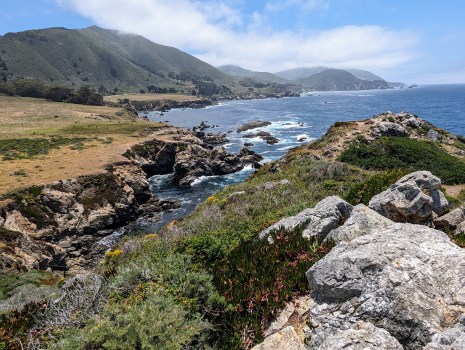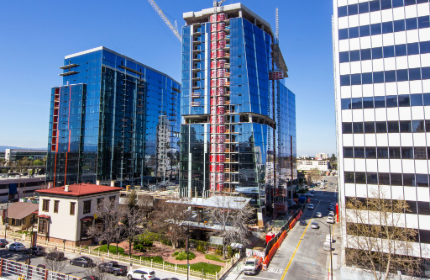Monaco billionaire agrees to provide public access to scenic Big Sur oceanfront property – The Mercury News
One of the most scenic properties in Big Sur, a craggy oceanfront promontory with views of sea otters, kelp beds and the famed Bixby Bridge will have guaranteed public access after years of “no trespassing” signs and locked gates.
The California Coastal Commission has reached an agreement with a Monaco billionaire, Patrice Pastor, to put up “coastal access” signs, build a public restroom, improve trails and guarantee public parking spaces at Rocky Point, located along Highway 1 about 10 miles south of Carmel.
 The area is the site of a well-known restaurant that dates back to 1947. The previous owners, Peter and Grace Wang, closed Rocky Point Restaurant in 2020 when the COVID pandemic began. Pastor — who also has bought other iconic properties in the Carmel area — purchased it in 2021 for $8 million and announced plans to refurbish and open a new high-end restaurant at the site.
The area is the site of a well-known restaurant that dates back to 1947. The previous owners, Peter and Grace Wang, closed Rocky Point Restaurant in 2020 when the COVID pandemic began. Pastor — who also has bought other iconic properties in the Carmel area — purchased it in 2021 for $8 million and announced plans to refurbish and open a new high-end restaurant at the site.
But the property didn’t come free and clear.
The Coastal Commission’s enforcement division had been investigating the Wangs for a significant number of violations, including adding parking onto an adjacent open space property owned by Monterey County, and constructing a deck, buildings, lighting and a leach field without the required permits. The couple also closed gates on the road leading from Highway 1 to the restaurant, put up no trespassing signs, and posted a guard when the restaurant was closed, even though the road runs over county-owned land.
Under a settlement signed May 17 by Pastor and the commission, he agreed to clear the violations. He will not face a fine if he makes the improvements to the 2.5-acre property and includes permanent public access in the deed and development rights to most of the bluffs surrounding the restaurant. The value of those rights, along with the new restrooms, trails, native plants, benches, signs, 24 parking spaces and eight electric vehicle chargers is roughly $4 million.
“This property is breathtaking,” said Lisa Haage, chief of enforcement for the Coastal Commission. “It is the kind of view that people think of when they think of the California coast. It is a gorgeous, gorgeous area — one of the iconic views of California.”
Pastor, 51, is the grandson of Jean-Baptiste Pastor, an Italian businessman and developer who in the 1920s and 30s won contracts to build the water supply system and soccer stadium in Monaco, a tiny country on the French Riviera, and with the proceeds bought land along the Monaco waterfront at low prices after World War II and made a fortune.
Today, Monaco is among the wealthiest and most exclusive places in the world, famous for its glamorous casinos, sunny beaches and Formula One Grand Prix race.
In recent years, Pastor has raised eyebrows — and some controversy — in Carmel. A real estate company he founded in 2015, Esperanza Carmel, has purchased at least 15 properties in the seaside enclave worth roughly $100 million, including the Carmel Beach Hotel, the Hog’s Breath Building, L’Auberge Carmel Hotel, and the La Rambla Building.
Last year he purchased an oceanfront home in Carmel designed by Frank Lloyd Wright for $22 million.
Representatives of his real estate company did not return calls asking about the Rocky Point agreement.
But in an interview in February with the Daily Mail, a London newspaper, Pastor said he “cannot understand” why some locals in Carmel are worried about his buying spree, which critics have said could raise rents.
“We love the town, and we want to protect its unique history and character,” Pastor told the newspaper.
The agreement to settle the coastal violations at Rocky Point is scheduled to be voted on by the full Coastal Commission on June 14 at its meeting in Morro Bay. If approved as expected, it does not affect Pastor’s plans to re-open the restaurant.
In 2022, he applied to Monterey County to operate a restaurant there with 166 seats, an inn with 14 units, and three employee housing units and a visitor center.
But that application does not comply with the new consent order, and coastal commission staff say they expect him to revise it, and he will be required to get approval before construction can occur.

In the meantime, environmental groups say the public access deal seems like a positive step for the Big Sur coast.
“There is great need in Big Sur for additional parking off the highway, and bathrooms,” said Rachel Saunders, director of conservation for the Big Sur Land Trust, a nonprofit environmental group. “There is a lot of concern about visitor management. If this land can be used in a way that helps address some of those issues, that’s a good thing.”
Saunders, who said she had not yet seen the staff report on the issue, noted that during holidays, including last Memorial Day weekend, popular areas in Big Sur have faced traffic jams, litter and people using the restroom along the side of the highway.
“There’s just a mass of humanity coming,” she said. “It’s a gorgeous place. I understand why people like to come. But there needs to be more done to provide adequate visitor facilities.”
The Rocky Point saga isn’t the first controversy involving wealthy people and the jaw-dropping scenery of Big Sur.
In 2013, Facebook billionaire Sean Parker held an extravagant Lord of the Rings-themed wedding in Big Sur, after which he agreed to pay $2.5 million to settle violations of California’s coastal laws because his crews built — without permits — rock walls, a stone bridge, a cottage, dance floor and other structures in a sensitive redwood forest campground owned by the Ventana Inn. Hundreds of guests, including California Gov.-elect Gavin Newsom, former Twitter CEO Jack Dorsey and others, attended the affair. Money from the settlement was used to fund environmental restoration, build trails and create an iPhone app, called YourCoast, to help the public find beaches, restrooms and parking along the California oceanfront.
At Rocky Point, Pastor took down the “no trespassing” signs and agreed to leave the gates open at the request of the Coastal Commission. The new agreement guarantees public access into the future regardless of who owns the property.
Visitors wandering near the area this week were confused.
“We were hungry and we thought maybe there were cheeseburgers or oysters here,” said Kristy Benson, a San Francisco resident. “Everything is closed. But the views are incredible.”









